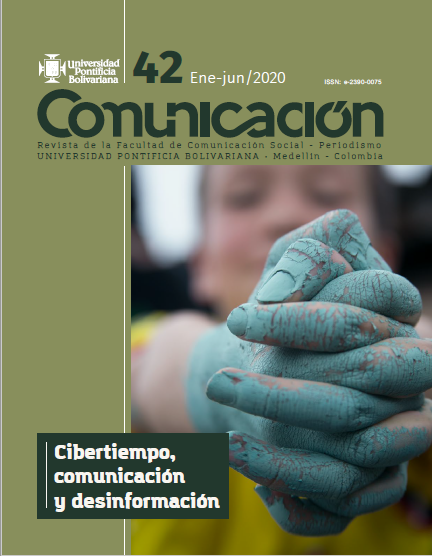Cybertime, or the temporary regime of communication modernity
Main Article Content
Abstract
Cybertime is a relatively new term that seems to be the counterface or complement to Cyberspace. However, it is not necessary as well. The concept, despite eing stated and late 1990s, has not been systematically explored, at least in relation to the socio-historical construction of time. The background is reduced, almost exclusively, to some works by the american Lance Strate (1996), the english Sean Cubitt (2000), the romanian Adrian Mihalache (2002) and the dutch Jos De Mul (2010), and Geert Lovink (2006; 2019). Almost none of these authors is still translated to Spanish.
Many of the references focus on the world of the economy. However, the scarce attention that the term deserves in relation to the theories of communication or sociology is striking, as if the temporalities produced by networks and virtuality had a product of cyberspace. About this particular situation, Cubitt called attention on “Cybertime: Ontologies of digital perception”, published in 2000.
References
Ayestarán, I. (2007). Capitalismo cognitivo en la economía high tech y low cost: de la ética hacker a la wikinomía. Argumentos de Razón Técnica, (10), pp. 89-123. https://idus. us.es/handle/11441/21738
Berardi, F. (2003). La fábrica de la infelicidad. Nuevas formas de trabajo y movimiento global. Madrid: Traficante de Sueños.
Berardi, F. (2010). Generación post-alfa. Patologías e imaginarios en el semiocapitalismo. Buenos Aires: Tinta Limón.
Carr, N. (2011). Superficiales. ¿Qué está haciendo Internet con nuestras mentes? Bogotá:
Taurus.
Colangelo, P. (2019). El instante y el infinito. Representaciones histórico-sociales del tiempo y del espacio en relación con las tecnologías de la comunicación e información. Tesis de Doctorado en Ciencias Sociales. Medellín: Universidad Pontificia Bolivariana.
Cubbitt, S. (2000). Cybertime: Ontologies of digital perception. Society for cinema studies, Chicago, marzo de 2000.
De Mul, J. (2010). Cyberspace Odyssey: Towards a Virtual Ontology and Antropology. Cambridge: Cambridge Scholars Publishing. https://philpapers.org/rec/DEMCOT
Fuchs, C. (2012). Una contribución a la crítica de la economía política del capitalismo informacional transnacional. Nómadas, (36), pp. 27-41.
Han, B-C. (2015). La sociedad de la transparencia. Barcelona: Herder.
Jenkins, H. (2009). Fans, bloggeros y videojuegos. La cultura de la colaboración. Barcelona: Paidós.
Lem, S. (2013). Vacío perfecto. Biblioteca del Siglo xxi. Madrid: Impedimenta.
Lovink, G. (2006). Indifference of the Networker presence on time management of self. En: R. Hassan & R. Purser (eds.), 24/7: Time and temporality in the Network Society. Palo Alto: Stanford Business Books.
Lovink, G. (2019). Tristes por diseño. Las redes sociales como ideología. Bilbao: Consonni.
Mattelart, A. & Vitalis, A. (2015). De Orwell al cibercontrol. Barcelona: Gedisa.
Mihalache, A. (2002). The cyber space-time continuum: meaning and metaphor. The Information Society, (18). Disponible en: https://pdfs.semanticscholar. org/293d/68b258a225dfeca10fbecbe1ec9af96e6ba9.pdf.
Rosa, H. (2016). Alienación y aceleración. Hacia una teoría crítica de la temporalidad en la modernidad tardía. Buenos Aires: Katz.
Scolari, C. (2008). Hipermediaciones. Elementos para una teoría de la comunicación digital interactiva. Barcelona: Gedisa.
Sennett, R. (2000). La corrosión del carácter. Las consecuencias personales del trabajo en el nuevo capitalismo. Barcelona: Anagrama.
Shapiro, J. (2015). Desafíos en educación: subjetividades virtuales, tic y cuerpo. Memoria de las XIII Jornadas Rosarinas de Antropología Socio-cultural. Rep-Hip-UNR - Aprendizaje e investigación, Universidad Nacional de Rosario. Disponible en: http://hdl.handle. net/2133/5428.
Sibilia, P. (2008). La sociedad como espectáculo. Buenos Aires: Fondo de Cultura Económica.
Strate, L. (2006). Eight Bits About Digital Communication. Razón y Palabra, (49), pp. 1-27.
Virilio, P. (1997). Cibermundo: ¿una política suicida? Santiago de Chile: Dolmen.





